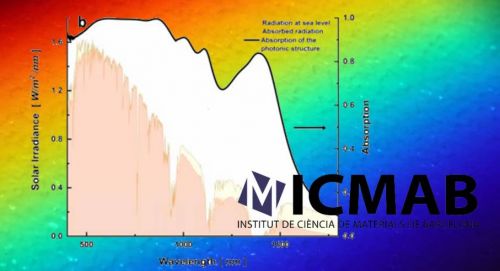
15/02/2018
ICMAB traps sunlight with superabsorbent nanomaterials
ICMAB traps sunlight with superabsorbent nanomaterials
In renewable energies, increasing efficiency is a key challenge in the production of “photovoltaic” electrons. This includes elaborating materials that can absorb the largest possible sunlight spectrum.
Great news from the Institute of Materials Science of Barcelona (ICMAB), a Barcelona Synchrotron Park’s partner: researchers led by Dr. Agustín Mihi, have created materials that largely absorb a wide range of the solar spectrum, between 400 and 1500 nm (visible light and infrared radiations), using an ultrathin layer of less than 100 nm thick of material.
The followed strategy, low cost and fully scalable, is based on combining the thin layer deposition of semiconductors on metals, and the nanostructuring of the material forming photonic crystals. The obtained superabsorbers materials have many potential applications, especially in the field of photovoltaic energy and photodetection.
Moreover, the researchers provide, in the study published in Advanced Materials, the design guidelines to synthesize other types of materials following the same strategy.
Great news from the Institute of Materials Science of Barcelona (ICMAB), a Barcelona Synchrotron Park’s partner: researchers led by Dr. Agustín Mihi, have created materials that largely absorb a wide range of the solar spectrum, between 400 and 1500 nm (visible light and infrared radiations), using an ultrathin layer of less than 100 nm thick of material.
The followed strategy, low cost and fully scalable, is based on combining the thin layer deposition of semiconductors on metals, and the nanostructuring of the material forming photonic crystals. The obtained superabsorbers materials have many potential applications, especially in the field of photovoltaic energy and photodetection.
Moreover, the researchers provide, in the study published in Advanced Materials, the design guidelines to synthesize other types of materials following the same strategy.
More news
11/03/2015
Sustainability: the Barcelona Synchrotron Park focuses on birds and bats…
05/03/2015
Wastewater that produces green energy
26/02/2015
ALBA, CSIC and Alibava develop an X-Ray detector
20/02/2015
The pressure that makes conductivity higher: new record in the ICN2
11/02/2015
Presentation of the Big Data CoE Barcelona initiative
06/02/2015
Come investigate at the ALBA synchrotron: 2015 new call for proposals









